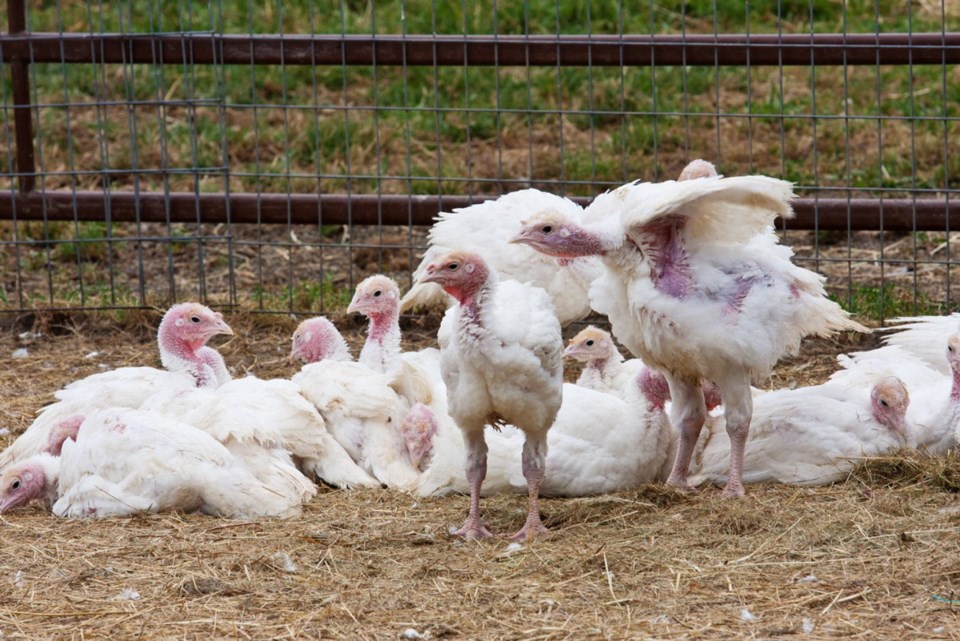While the marketing board for turkeys in B.C. says the local industry is thriving, Vancouver Island turkey farmers are calling foul.
There are 10 turkey farms on Vancouver Island and one on Gabriola Island, according to the B.C. Turkey Farmers, the marketing board for the provincial industry. Island farms remain small, with flock sizes averaging 500, compared with mainland flocks that typically range between 4,000 and 8,000.
Since 2006, seven new turkey producers have joined the Vancouver Island industry, an increase that general manager Michel Benoit credited to the marketing board’s “new entrant” program, which was created to encourage regional farming. In the same time frame, he said, only three farms closed or left the industry.
But local farmers tell a different story.
Lori Gillis, who has run an abattoir in Qualicum Beach called the Cluck Stops Here for 17 years, said business is harder than ever for small farmers.
As a poultry processor, Gillis has been struck with increasing provincial regulation that she says is out of touch with the realities of farm life. It puts undue pressure on both small producers and processors.
“The new meat inspection system is just putting a terrible crunch on everyone,” she said. “We’re going to slowly see the end of the local growers because of the obstacles being presented.”
Because of the extra steps and precautions that she must now take — from inspecting for rare diseases to labelling — her processing time is down to 25 birds an hour, from between 40 and 60. As a result, her labour costs increase, which means processing becomes more expensive for everyone.
“A lot of farmers I know are getting out of [turkey farming],” she said. “One farmer just came through with 135 turkeys and he said, ‘This is it for me.’ … It’s really sad.”
Cowichan Valley Farms’ Jim Peach, who joined the turkey industry as a “new entrant” with his wife, Pat, also cited increased regulation as one of the biggest challenges for producers.
“It’s really hard,” Peach said. “It’s [basically] illegal for a farmer to be a farmer.”
While biosecurity regulations make sense for the massive mainland farms that can have flocks of up to 50,000 birds, the extra workload puts unfair pressure on him and his flock of 2,000 per year, he said. The result is an unhealthy industry, he said.
“I think if the consumer and government gave us a break, we could re-establish a good healthy agricultural industry on Vancouver Island and supply entry-level jobs for a lot of folks. It’s not glorious work, but it’s work. And it saves agricultural land and it takes the risk out of agricultural land being used for development.”
Jean Ireland, who is raising 1,300 turkeys for Thanksgiving and 1,500 for Christmas, said the Vancouver Island community is generally supportive of small farms. She pays $10 a bird in processing fees. But she said consumers recognize the value of buying from local small farms and are willing to pay.
“People on the Island are very, very loyal and they really support Island farmers,” she said. “We have to charge more than you’d charge in a grocery store. But people really support us, so we can make a fairly decent living.”
According to the Ministry of Agriculture, B.C. raised more than 2.7 million turkeys in 2012 and total turkey production rose five per cent from previous years to 21,400 tonnes.
There are about 64 turkey producers in the province, according to B.C. Turkey Farmers.
Tom Henry, a Metchosin farmer with chickens and founding editor of Small Farm Canada magazine, said there’s still room for improvement.
“Speaking of poultry in general, there’s frustration with the marketing boards’ limitations on small producers,” he said.
But he said there has been a trend toward liberalization — like adding permits to the quota system, which create space for smaller flocks.
Southern Vancouver Island has a generally healthy small farming community, from Henry’s perspective, and it will continue to improve.
“I like to think we’re at a midpoint. From the battle days circa ’87 to what I think is going to be the happy hunting ground of 2023, we’re about midway.”



